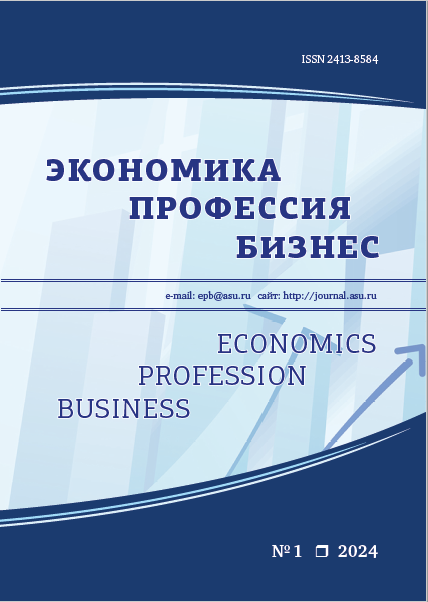ASSESSMENT OF ORGANIZATIONAL AND ADMINISTRATIVE ASPECTS OF CONVICTS’ LABOR ADAPTATION IN PENITENTIARY INSTITUTIONS OF VARIOUS TYPES
УДК 343.823:331
Abstract
Currently, due to the social orientation of convicts' work, the study of the organizational and administrative features of their labor adaptation in various types of correctional institutions is relevant, and its results are of practical importance for substantiating measures to improve the sphere of penitentiary employment. In this regard, the article analyzes the results of a questionnaire survey of convicts held in open and semi-open penitentiary institutions on the example of colonies-settlements and correctional colonies of strict regime, which was conducted by the author in accordance with the purpose of the study. The choice of the investigated correctional institutions and the volume of the sample population are justified. The main attention is paid to the problems of organizing the work of convicts in the correctional institutions under consideration and the role of employees in this process, the working conditions of convicts, the degree of satisfaction with the work performed, and the peculiarities of their attitude to employment in the post-penitentiary period. Some measures are proposed to improve the content and organizational aspects of the activities of correctional institutions to adapt to the work of persons held in them.
Downloads
Metrics
References
Южанин В. Е. Исправительная колония-поселение — разновидность лишения свободы // Пенитенциарная наука. 2018. № 1. С. 18-25.
Краткая характеристика уголовно-исполнительной системы. URL: https://fsin.gov.ru/structure/inspector/iao/statistika/Kratkaya%20har-ka%20UIS/ (дата обращения: 18.01.2024).
Уголовно-исполнительный кодекс Российской Федерации от 08.01.1997 № 1-ФЗ (ред. от 24.06.2023). URL: https://www.consultant.ru/document/cons_doc_LAW_12940/ (дата обращения: 18.01.2024).
DelSesto M. Contested theories of prison labor practice // Sociology Compass. 2021. № 15. DOI: 10.1111/ soc4.12888.
Sliva Sm., Samimi C. Social Work and Prison Labor: A Restorative Model // Social Work. 2018. № 63. Pp. 153-160. DOI: 10.1093/sw/swy009.
Чернышов И. Н. Труд осужденных к лишению свободы: противоречия и пути их разрешения: дис. ... канд. экон. наук. М., 2016. 225 с.
Кошевой О. С., Карпова М. К. Определение объема выборочной совокупности при проведении региональных социологических исследований // Известия вузов. Поволжский регион. Общественные науки. 2011. № 2. С. 98-104.
Слепцова Е. В., Сапрунова Д. Современные взгляды на адаптацию работника: сущность, виды, функции и факторы адаптации // Международный журнал гуманитарных и естественных наук. 2020. № 8-1. С. 179-181. DOI: 10.24411/2500-1000-2020-10956.
Солодова Е. П., Исаходжаев Р. А. Адаптация персонала: сущность, виды, показатели оценки // Экономика и управление: теория, методика, практика: сб. статей. Чебоксары, 2020. С. 82-87.
Дятлов Ю. Н. Специфика видов и показателей эффективности трудовой адаптации осужденных // Научное обозрение: теория и практика. 2023. Т. 13, № 1. С. 128-140.
REFERENCES
Yuzhanin V. E. Correctional colony-settlement — a kind of imprisonment. Penitentiary science. 2018. No. 1. Pp. 18-25.
Brief description of the penal enforcement system. URL: https://fsin.gov.ru/structure/inspector/iao/statistika/Kratkaya%20har-ka%20UIS/ (date of access: 18.01.2024).
The Penal Code of the Russian Federation of 08.01.1997 No. 1-FZ (an edition of 24.06.2023). URL: http://www.consultant.ru/document/cons_doc_LAW_12940/ (date of access: 18.01.2024).
DelSesto M. Contested theories of prison labor practice. Sociology Compass. 2021. No. 15. DOI: 10.1111/soc4.12888.
Sliva Sm., Samimi C. Social Work and Prison Labor: A Restorative Model. Social Work. 2018. № 63, Pp. 153-160. DOI: 10.1093/sw/swy009.
Chernyshov I. N. The work of those sentenced to imprisonment: contradictions and ways to resolve them: dissertation of the Candidate of Economic Sciences. Moscow, 2016. 225 p.
Koshevoy O. S., Karpova M. K. Determining the volume of a sample population during regional sociological research. Izvestiya vuzov. The Volga region. Social sciences. 2011. No. 2. Pp. 98-104.
Sleptsova E. V., Saprunova D. Modern views on employee adaptation: the essence, types, functions and factors of adaptation. International Journal of Humanities and Natural Sciences. 2020. No. 8-1. Pp. 179-181. DOI: 10.24411/2500-1000-2020-10956.
Solodova E. P., Isakhodzhaev R. A. Personnel adaptation: essence, types, evaluation indicators. Economics and management: theory, methodology, practice: collection of articles. Cheboksary, 2020. Pp. 82-87.
Dyatlov Yu. N. Specifics of the types and indicators of the effectiveness of labor adaptation of convicts. Scientific review: theory and practice. 2023. Vol. 13. No. 1. Pp. 128-140.
Copyright (c) 2024 Юрий Николаевич Дятлов

This work is licensed under a Creative Commons Attribution 4.0 International License.
Economics Profession Business is a golden publisher, as we allow self-archiving, but most importantly we are fully transparent about your rights.
Authors may present and discuss their findings ahead of publication: at biological or scientific conferences, on preprint servers, in public databases, and in blogs, wikis, tweets, and other informal communication channels.
Economics Profession Business (EPB) allows authors to deposit manuscripts (currently under review or those for intended submission to EPB) in non-commercial, pre-print servers such as ArXiv.
Authors who publish with this journal agree to the following terms:
- Authors retain copyright and grant the journal right of first publication with the work simultaneously licensed under a Creative Commons Attribution License that allows others to share the work with an acknowledgement of the work's authorship and initial publication in this journal.
- Authors are able to enter into separate, additional contractual arrangements for the non-exclusive distribution of the journal's published version of the work (e.g., post it to an institutional repository or publish it in a book), with an acknowledgement of its initial publication in this journal.
- Authors are permitted and encouraged to post their work online (e.g., in institutional repositories or on their website) prior to and during the submission process, as it can lead to productive exchanges, as well as earlier and greater citation of published work (See The Effect of Open Access).









